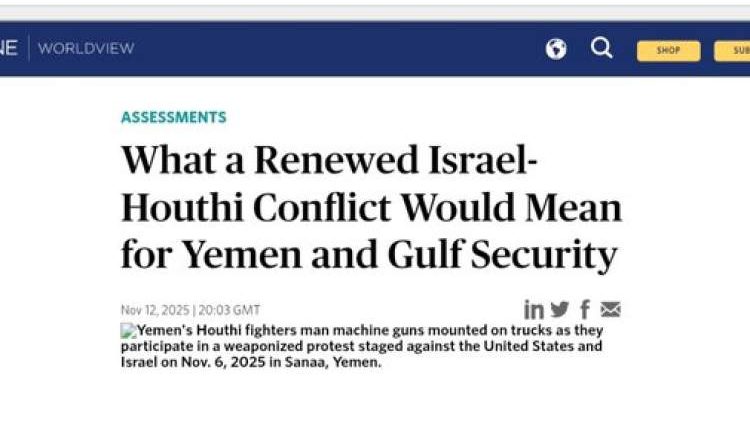Report Highlights Scenarios for the Resumption of War Targeting Israel and the Gulf
The RANE Worldview Center has published a new report examining the critical moment the region is experiencing, warning that any upcoming Israeli military action against Yemen could reignite a conflict whose repercussions would extend beyond the Red Sea and deep into the Gulf region.
Despite the report’s attempt to frame its language with “international concern,” it implicitly acknowledges that Sana’a has become a significant and unavoidable actor in regional security calculations, and that any Israeli military adventure would trigger broad consequences for international shipping and for the alliances formed over the past two years.
The report opens by referencing direct Israeli threats issued by Prime Minister Benjamin Netanyahu about preparations for new military action against Yemen. These were met with a clear response from Yemen’s revolutionary leader, Sayyed Abdul-Malik al-Houthi, who stated that the confrontation is part of an “open conflict with Israel,” and that any aggression would be met with immediate retaliation.
According to the report, this dynamic raises the likelihood that Sana’a could resume attacks on ships linked to Israel, along with ballistic and drone strikes—especially if Israeli operations in Gaza resume.
The report further notes that although Sana’a reduced its operations somewhat after the ceasefire, it has not officially declared a halt to them. It adds that northern Yemeni tribes have seen significant mobilization in recent weeks, suggesting preparations based on the principle of “postponed, not concluded, confrontation.”
The report acknowledges that Yemen has been a central source of pressure on the United States and Israel during the past two years. Precision strikes on Western and Israeli-linked vessels placed the Red Sea at the heart of the conflict and forced Washington to reshape its military presence, though it failed to neutralize the impact of Yemeni attacks.
It also recalls that the United States ended its wide-scale military operations against Sana’a in May after the failure of its “deterrence through airstrikes” strategy, while Sana’a continued intermittent strikes on targets linked to Israel.
The report examines fragmentation within the Saudi- and Emirati-backed factions in Yemen. Although these groups attempt to present a façade of unity, they remain locked in fierce competition over territory and influence. The report states that Abu Dhabi has increased support for its loyal factions, while Riyadh pursues a more cautious approach due to concerns that fighting may again spill over into its southern border.
The report presents a scenario it considers “highly likely”: that Israel may resort to targeted assassinations and precision strikes against prominent Yemeni leaders—similar to strikes in recent months that targeted the prime minister and chief of staff in Sana’a.
However, it also concedes that Israel’s intelligence capabilities in Yemen are limited, and that the country’s rugged mountainous terrain and absence of local support would make any long-term military operation “costly and unsustainable.”
Conversely, the study expects Sana’a to respond with ballistic and drone attacks on Israeli targets, along with reactivating the naval blockade against Israel-linked vessels.
The report underscores the risk this scenario poses to global shipping, noting that major companies such as MSC, CMA CGM, and Maersk continue to avoid the Red Sea despite the recent decline in attacks. It predicts that any renewed escalation would force shipping routes to divert around the Cape of Good Hope, significantly increasing both time and cost for trade between Asia and Europe.

